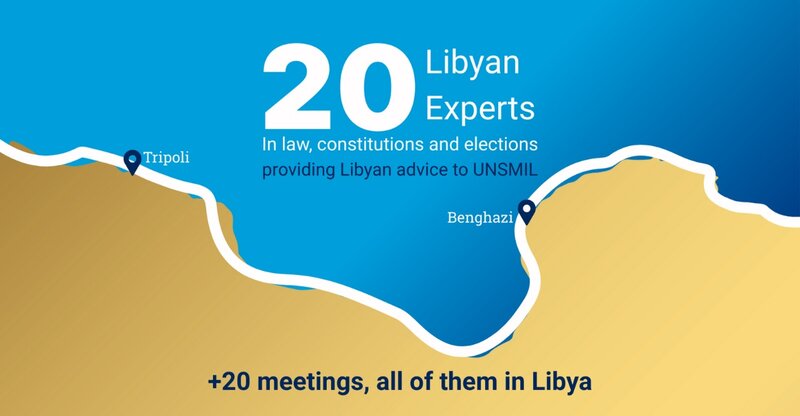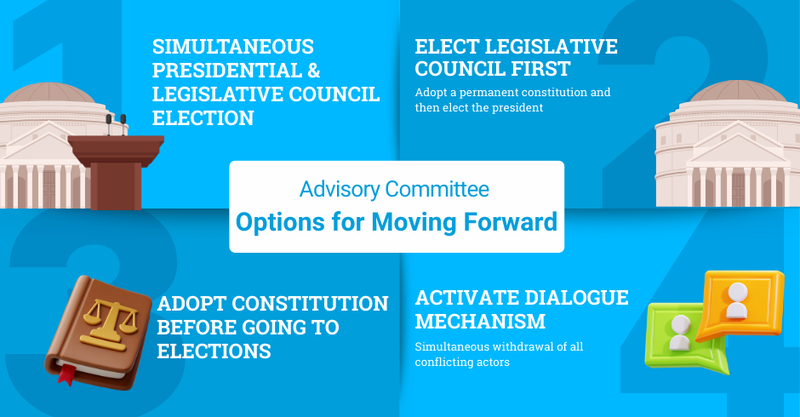Quick facts: Options presented to UNSMIL by the Advisory Committee
How Libya can move toward elections and end the transitional period.
|
|
|
Background
On 4 February 2025, the United Nations Support Mission in Libya established an Advisory Committee made up of 20 Libyan political, constitutional, electoral and legal experts, including men and women from all regions of the country and different cultural components. The Committee was tasked to propose technically sound, politically implementable options to resolve contentious issues that are delaying elections, with the goal of helping Libya to unify its institutions and move toward peace and stability.
The Committee’s work is grounded in paragraphs 2 and 5 of Security Council Resolution 2755 (2024). Paragraph 2 underlines the Security Council’s “full support for UNSMIL, in particular its mediation and good-offices role to further an inclusive political process, building on the basis of the Libyan Political Agreement and the Libyan Political Dialogue Forum (LPDF) Roadmap, and building on the updated electoral laws.” Paragraph 5 “urges the Libyan political institutions and key stakeholders to resolve the outstanding politically contentious issues pertaining to the elections as soon as possible,” and “to engage fully, transparently and in good faith" in the political process in order to deliver free, fair, transparent and inclusive national elections, aiming inter alia to form a “unified Libyan government able to govern across the country and representing the whole people of Libya.”
The Advisory Committee submitted its final report to UNSMIL on 5 May 2025. UNSMIL is now sharing the options they presented with political actors, the wider spectrum of Libyan society, and regional and international actors. This feedback will inform next steps in the UNSMIL-facilitated political process.
Why the Advisory Committee was established?
The Committee was established against a backdrop of deepening political division, institutional fragility, deteriorating economic conditions and rising public dissatisfaction with the status quo.
-
Libya’s political stalemate is a threat to Libya’s national unity and territorial integrity.
-
The absence of legitimate permanent governance structures threatens the legitimacy of all institutions and their credibility.
-
Public frustration is growing, with 2.8 million registered voters still awaiting elections.
-
Political paralysis, resulting in dual government spending and a lack of transparency, accountability and oversight, is destabilizing Libya’s economy.

The focus of the Advisory Committee
The Committee assessed the constitutional and legal framework underpinning Libya’s electoral process, including the existing legal framework provided in Constitutional Amendment 13 and Laws 27 and 28 (2023). It sought to identify legal ambiguities, structural deficiencies, and political obstacles to holding national elections. Consultations included discussion with the 6+6 Committee and the High National Elections Commission (HNEC), as well as a review of national and international legal instruments.
Key problems and proposed options
The Committee identified and proposed options to address key contentious issues in the current electoral framework.
1. Linking parliamentary and presidential elections
-
Problem: The law says parliamentary elections are only valid if presidential elections succeed.
-
Solution: Delink the outcomes and remove the dependency of parliamentary elections on presidential elections.
2. Holding both elections at the same time
-
Problem: Having both elections on one day raises political and logistical issues.
-
Solution: Organize sequential presidential and parliamentary elections within a well-defined time frame.
3. Eligibility criteria
-
All candidates with dual nationality must disclose their status. If they win, after the preliminary count and after exhausting the appeals period, they must provide evidence of starting the process to relinquish the second nationality. If the winning candidate fails to do so, a new presidential election will be called, the results of the parliamentary elections will be announced, and the head of the Senate will temporarily assure the president’s prerogatives.
-
If a presidential candidate is under investigation for a crime, they cannot be excluded unless there is a final verdict.
-
Allow military personnel and senior government officials to participate as candidates under conditions regulated by law.
4. Second round requirement
-
Problem: Even if someone wins a majority in the first round of presidential elections, in the current law, a second round of voting is still required.
-
Solution: If a candidate wins more than 50 percent in the first round of voting, a second round isn’t necessary for presidential elections.
Additional recommendations
-
Increase women’s representation to 30 percent in both the Senate and the House of Representatives.
-
Ensure fair and proportional representation of cultural groups with at least 15 percent in the Senate.
-
Require national ID numbers for voter registration to safeguard electoral integrity.
-
Reconstitute the High National Elections Commission.
-
Establish robust security protocols to ensure safe and inclusive elections.
-
Improve electoral dispute resolution mechanisms to reduce space for contestation.

Roadmap options
The Committee presented four potential roadmaps toward ending the transitional period and holding elections.
-
Option 1: Presidential and legislative elections are to be conducted within two years, commencing once a political settlement is reached on the legal status and financial independence of HNEC, the necessary amendments to the constitutional and legal framework for elections, and a unified government. The political settlement should include provisions for adopting a permanent constitution for the country.
-
Option 2: A bicameral legislative council will be elected within two years, with the drafting and ratification of the constitution entrusted to the Senate. The new constitution will regulate all subsequent presidential and parliamentary elections.
-
Option 3: Adopt a constitution, prior to elections. This option involves examining the challenges associated with the 2017 draft constitution and exploring the feasibility of drafting a new constitution.
-
Option 4: Activate the dialogue mechanism and replace existing institutional stakeholders with a constituent assembly through LPA Article 64 dialogue process.
Before any option can be adopted, the Committee recommended that a political settlement be reached among key actors to establish a conducive environment for elections, including:
-
Reconstituting the HNEC board;
-
Granting HNEC financial independence;
-
Enacting a new amendment to the Constitutional Declaration;
-
Amending electoral laws to ensure their implementability; and
-
Reaching an agreement on a new executive authority with a defined mandate and timeframe.
Guarantees and oversight mechanisms
To ensure a credible process, the Committee recommended the following:
-
Political recognition of the new government.
-
A timebound mandate with a mechanism to assess the government's performance, allowing for its dismissal if it fails to prepare adequately for the elections.
-
Restrictions on long-term financial or political commitments by the interim government.
-
A national code of ethics for political conduct during elections.
-
An independent national body to monitor the electoral process.
-
A national arbitration mechanism for resolving disputes.
Call for action
The Advisory Committee affirmed that legislative reform alone will not secure a successful transition. Rather, a comprehensive political settlement is essential, underpinned by national consensus and inclusivity. The Committee called upon all Libyan stakeholders to work in good faith with UNSMIL to build a unified, sovereign, and democratic Libya.
 United Nations Peacekeeping
United Nations Peacekeeping UN
UN








